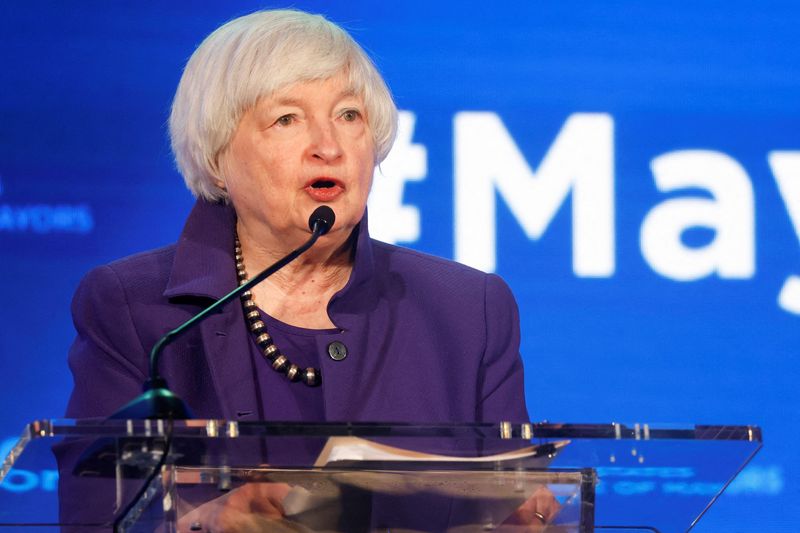By David Lawder and Andrea Shalal
WASHINGTON (Reuters) - U.S. Treasury Secretary Janet Yellen on Friday rebranded the Biden administration's economic agenda as "modern supply-side economics," using a Reagan-era phrase favored by Republicans to assert that Democrats' spending plans will boost the U.S. economy's productive capacity.
Yellen said in a speech to the World Economic Forum that rather than tax cuts and deregulation, her modernized version seeks to increase labor supply and improve infrastructure, education and research to boost potential U.S. growth and ease inflationary pressures.
"Our new approach is far more promising than the old supply- side economics, which I see as having been a failed strategy for increasing growth," Yellen said. "Significant tax cuts on capital have not achieved their promised gains. And deregulation has a similarly poor track record in general and with respect to environmental policies — especially so with respect to curbing CO2 emissions."
Yellen did not announce any policy shifts as she introduced the concept, which suggests it may be a new tactic to persuade Americans and moderate Democrats in Congress to support the "Build Back Better" social spending and climate investment plan, which stalled in December.
The new nomenclature emphasizes the administration's efforts to expand the U.S. workforce - a sentiment echoed by President Joe Biden in a speech to mayors on Friday - and increase productivity, forces that could help quell inflationary pressures while supporting a stronger growth rate.
The administration is trying to blunt the political fallout from high inflation that hit 7% last month amid labor, housing and goods shortages, the biggest annual increase in nearly 40 years, and counter claims that further spending would fuel further inflation.
A DIFFERENT SUPPLY SIDE
Yellen's vision of "supply-side economics" would differ greatly from the "Reaganomics" version that burst into the mainstream in the 1980s with the election of Ronald Reagan as president.
Then, lower taxes and lighter regulation were touted as the fuel that would make U.S. businesses more competitive and profitable, unleashing capital investment that would "trickle down" to the wider economy, fueling growth and hiring.
At the same time, Republicans argued, the tax cuts would "pay for themselves" through turbocharged growth - a phenomenon that has never come to pass.
Yellen argued that the "supply" needs of the economy center around the availability of labor, which has been constrained by the pandemic and in the view of Democrats by the absence of policies around things like child and elder care that could allow more people to join the workforce.
Yellen identified two years of universal early childhood education and an expanded earned income tax credit as "core" components of the Build Back Better plan going forward.

She added that Republican-passed tax cuts in 2017, rather than encourage investment in the United States, have perpetuated the 'perverse corporate tax incentives' that have encouraged companies to shift productive capacity overseas as countries compete on taxes. The deal for a global 15% corporate minimum tax, which depends on passage of Build Back Better for implementation, would end this "race to the bottom" she said.
"Modern supply-side economics seeks to spur economic growth by both boosting labor supply and raising productivity, while reducing inequality and environmental damage," Yellen said. "Essentially, we aren’t just focused on achieving a high topline growth number that is unsustainable — we are instead aiming for growth that is inclusive and green."